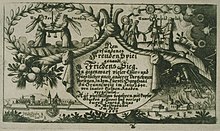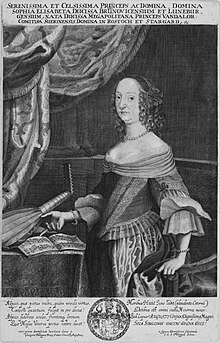Sophie Elisabeth of Mecklenburg

Sophie Elisabeth, Duchess of Mecklenburg [-Güstrow] (* August 20, 1613 in Güstrow ; † July 2, 1676 in Lüchow ) was a daughter of Duke Johann Albrecht II of Mecklenburg [-Güstrow] (* May 5, 1590; † April 23, 1636). By marriage she became Duchess of Braunschweig and Lüneburg and Princess of Braunschweig-Wolfenbüttel .
Life
Duchess Sophie Elisabeth belongs to the 17th generation of the Mecklenburg Princely House and came from the line of the sub-duchy of Güstrow . She was very musical and received her artistic training at her father's court, where the English composer and viol virtuoso William Brade was employed. She was also linguistically and intellectually well trained in order to be able to perform her representative duties at the Prince's court.
Sophie Elisabeth married in 1635 August the Younger , Duke of Braunschweig-Lüneburg, Prince of Braunschweig-Wolfenbüttel , who ascended the throne in the same year. She was the third wife of the 56-year-old at the age of 21 and bore him three more children:
- Ferdinand Albrecht I (22 May 1636 - 23 April 1687)
- Maria Elisabeth (7 January 1638 - 15 February 1687) - 1663 married to Adolf Wilhelm II (15 May 1632 - 21 November 1668), Duke of Saxony-Eisenach ; in second marriage 1676 Albrecht von Sachsen-Coburg (* May 24, 1648 - † August 6, 1699)
- Christoph Franz (born August 1, 1639 - † December 8, 1639)
In 1638 she made the acquaintance of Heinrich Schütz in Dresden, whose pupil she became. She also maintained contact with Georg Philipp Harsdörffer in Nuremberg and took part in the Fruit-Bringing Society with her husband . She also made a contribution to the upbringing of the existing sons and daughters of the "Prince of Peace" and placed the linguist Justus Georg Schottelius as a private teacher for her stepchildren Anton Ulrich , Sibylle Ursula and Clara Augusta and her own son Ferdinand Albrecht . Sigmund von Birken worked as an educator for a year and later remained an advisor to the royal family.
She herself made significant contributions to the culturally lively atmosphere of the Princely Court: she composed baroque musical plays and suggested community poems, wrote edification literature, poems, various dramas and librettos as well as courtly masquerades that have been handed down as manuscripts. From the successful French novel L'Astrée by Honoré d'Urfé , she released a narrative thread and translated it (freely) as the novel Die histori der Dorinde , with which she refined the social forms at court.
In 1642, on the occasion of the separate peace between Austria and Mecklenburg, which had been concluded a few years earlier, she composed a “re-invented joy game, called Friedenssieg”, which, together with Sigmund Theophil Stadens “ Seelewig ” (1644, text: Harsdörffer ), is one of the oldest surviving German music theater pieces. From 1648 the organization of the court festivals was in her hands, whereby she expanded the Wolfenbütteler Hoftheater into a cultural center. Mainly ducal family members and relatives performed there in front of a selected audience at the court. Especially in questions of state policy, the princess publicly gave testimony to her convictions on the stage, for example in 1656 with the publication of her drama Ein Frewdenspiell of the current affairs in the world . In it, a good and virtuous prince is contrasted with a ruthless and depraved prince as an opponent, both of whom are followed by subjects of the respective state theory for good and evil. The absolute prince is legitimized as sovereign in this and other plays, but he should serve as a model.
Sophie Elisabeth's grave is in the Marienkirche Wolfenbüttel .
literature
- Hermann Kretzschmar: History of the New German Song . Breitkopf & Härtel, Leipzig 1911, p. 36.
- Barbara Becker-Cantarino: The long way to maturity . 1987, ISBN 3-476-00612-3 , pp. 248-252.
- Linda Maria Koldau : Women - Music - Culture. A manual on the German-speaking area of the early modern period . Cologne / Weimar 2005, ISBN 3-412-24505-4 , pp. 189–198 (preview on Google Books ).
Web links
- Literature by and about Sophie Elisabeth zu Mecklenburg in the catalog of the German National Library
- Literature about Sophie Elisabeth in the state bibliography MV
- Publications by and about Sophie Elisabeth zu Mecklenburg in VD 17 .
Individual evidence
- ^ Duchess Sophia Elisabeth of Braunschweig-Lüneburg on heinrich-schuetz-haus.de
- ^ A b c Ute Brandes: Study room, poet club, court society. Creativity and the cultural framework of female storytelling in the baroque era. In: Gisela Brinker-Gabler (Hrsg.): Deutsche Literatur von Frauen , Volume 1, Darmstadt / Munich 1988, ISBN 3-406-33118-1 , pp. 236–245.
- ^ Karl Wilhelm Geck: Sophie Elisabeth Duchess of Braunschweig and Lüneburg (1613–1676) as a musician. Saarbrücken 1992.
| personal data | |
|---|---|
| SURNAME | Sophie Elisabeth of Mecklenburg |
| ALTERNATIVE NAMES | Sophie Elisabeth (full name); Mecklenburg, Sophie Elisabeth zu (wrong name form) |
| BRIEF DESCRIPTION | Duchess of Mecklenburg, composer and writer |
| DATE OF BIRTH | August 20, 1613 |
| PLACE OF BIRTH | Guestrow |
| DATE OF DEATH | July 2, 1676 |
| Place of death | Lüchow |

